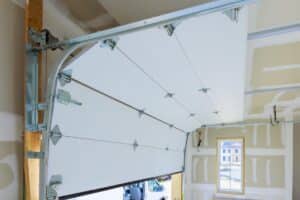When it comes to our homes, we often focus on the insulation of walls, roofs, and windows, but what about the garage doors? Many homeowners overlook the importance of insulating their garage doors, not realizing that it can have a significant impact on energy efficiency and temperature control. In this article, we will delve into the role of insulation in garage doors, educating you on why it matters and how it can benefit your home.
What is Garage Door Insulation?
Garage door insulation serves as a vital addition to the construction of your garage door. It involves incorporating a layer of specialized material into the door’s structure, strategically designed to enhance its thermal qualities. This insulation layer plays a crucial role in maintaining a controlled and comfortable environment within your garage.

By effectively moderating temperature fluctuations, it contributes significantly to improving the overall energy efficiency of your home. In simpler terms, garage door insulation acts as a barrier that prevents the loss of heat during chilly winters and keeps excessive heat out during scorching summers, ultimately making your living space more eco-friendly and cost-effective.
Types of Garage Door Insulation
When it comes to garage door insulation, you have several options at your disposal, each with its distinct characteristics and advantages. These insulation materials cater to various needs and preferences, allowing you to choose the one that best suits your requirements.
- Foam Board Insulation: This type of insulation utilizes rigid foam panels that are lightweight and effective at providing thermal resistance. Foam board insulation is known for its ease of installation and exceptional insulation properties, making it a popular choice for garage doors.
- Reflective Foil Insulation: Reflective foil insulation consists of layers of foil and plastic, forming a barrier that reflects radiant heat. It’s particularly useful in areas with intense sunlight exposure. This insulation type helps to maintain a cooler temperature inside the garage by reflecting the sun’s rays away.
- Fiberglass Insulation: Fiberglass insulation involves the use of fine glass fibers, creating a fluffy material that is excellent at trapping heat. While it’s commonly used in wall and attic insulation, it can also be adapted for garage doors. Fiberglass insulation provides effective thermal performance and noise reduction.
Each of these insulation types has its own set of unique properties and benefits. Your choice should depend on factors like climate, budget, and specific insulation requirements for your garage. Whether you prioritize energy efficiency, noise reduction, or cost-effectiveness, there’s a garage door insulation material that’s right for you.
Why Is Insulation Important?
Reason 1: Energy Efficiency
Garage door insulation serves as a powerful ally in the quest for improved energy efficiency within your home. Here’s how it works:
During the winter months, a well-insulated garage door acts as a formidable barrier, staunchly preventing precious heat from escaping into the chilly outdoor air. This retention of warmth translates to reduced reliance on your heating system, ultimately trimming down those hefty energy bills.

Conversely, when the sweltering summer sun bears down, insulated garage doors prove equally effective. They serve as a shield, keeping the scorching heat at bay, which means less need for aggressive air conditioning. This dual-action not only conserves energy but also fosters a more comfortable living environment throughout the year.
In essence, by investing in garage door insulation, you’re not just bolstering the thermal efficiency of your home; you’re also making a smart, eco-conscious choice that has a positive impact on your utility bills.
Reason 2: Temperature Control
Imagine using your garage as a workspace or storage area. Without proper insulation, extreme temperature fluctuations could wreak havoc on the items stored inside. During the scorching summer months, the heat could potentially damage sensitive equipment or delicate belongings.

On the flip side, during freezing winters, the lack of insulation might subject your garage to bitter cold, making it an inhospitable place to work or access stored items. This can be particularly problematic if you have items like paint, tools, or electronics that are sensitive to temperature extremes.
By insulating your garage door, you create a stable and comfortable environment regardless of the weather outside. It acts as a buffer, preventing the harsh outdoor conditions from affecting the temperature inside. This means your workspace remains conducive, and your stored possessions remain safe from the detrimental effects of temperature swings. In essence, garage door insulation safeguards your valuable items and ensures that your garage serves its purpose effectively year-round.
The Benefits of Insulated Garage Doors
Now that you know why garage door insulation matters, let’s take a look at some of the main benefits you may see when you prioritize insulation.
Benefit 1: Lower Energy Bills
Insulating your garage door isn’t just a simple home improvement; it’s a savvy financial decision. Here’s how it translates into lower energy bills:
When your garage door lacks insulation, it becomes a gateway for temperature exchange between the indoors and outdoors. In colder months, the warmth inside your home easily escapes through the non-insulated garage door, prompting your heating system to work overtime. This can lead to skyrocketing energy bills.

Conversely, in scorching summer weather, the heat infiltrates through the uninsulated garage door, making your air conditioning system struggle to maintain a comfortable indoor temperature. Again, this results in increased energy consumption and higher cooling costs.
Now, envision a scenario where your garage door is adequately insulated. It acts as a steadfast barrier, preventing heat loss during winter and heat intrusion during summer. With this thermal stability, your HVAC system operates more efficiently, expending less energy in the process. As a result, you witness a noticeable reduction in your energy bills, providing both comfort and savings for your household.
In essence, insulating your garage door isn’t just an investment in comfort; it’s a smart financial move that puts money back in your pocket through energy savings.
Benefit 2: Increased Comfort
Whether you’re tinkering away on DIY projects, using your garage as a home gym, or simply entering your car, comfort matters. Without insulation, your garage can transform into an inhospitable space during extreme temperatures. The biting cold of winter or the sweltering heat of summer can make it an unpleasant place to be.

However, when you insulate your garage door, you’re essentially taking control of its climate. It becomes a space where you can comfortably pursue your hobbies or activities year-round. No longer will you dread entering a frigid garage in the winter or a stifling one in the summer.
Moreover, this increased comfort isn’t limited to the garage itself. By moderating the temperature, insulated garage doors contribute to a more comfortable living environment inside your home as well. You’ll feel the difference as your HVAC system works more efficiently, ensuring that your entire living space remains consistently cozy.
In essence, investing in garage door insulation isn’t just about comfort in your garage; it’s about enhancing your overall quality of life, no matter the season.
Benefit 3: Noise Reduction
Living in a bustling neighborhood or near a busy street can subject your home to a constant barrage of external noises—traffic, neighbors, and other disturbances. Without proper insulation, these sounds can easily penetrate your garage and, in turn, infiltrate your living spaces.
However, when you invest in an insulated garage door, you’re installing a formidable barrier against unwanted noise. The insulation materials act as a buffer, dampening sound vibrations and keeping external noises where they belong—outside. This is particularly valuable if you use your garage as a living space, home office, or workshop, where peace and quiet are paramount.

Additionally, a quieter garage enhances your overall living experience. It ensures that you can enjoy the serenity of your home without the constant intrusion of outside noise, fostering a more peaceful and enjoyable atmosphere for you and your family.
In summary, the noise reduction benefits of insulated garage doors extend beyond the garage itself. They create a more peaceful and comfortable living environment, shielding you from the disruptions of the outside world.
Benefit 4: Durability
Garage doors are subjected to the harshest of weather conditions year-round. They face the scorching heat of summer, the biting cold of winter, and everything in between. However, when you opt for garage door insulation, you’re not just enhancing energy efficiency; you’re also bolstering the door’s durability. Here’s how:
Insulation materials serve as a protective shield for your garage door. They create a barrier that shields the door from the full brunt of temperature fluctuations. During sweltering summers, the insulation prevents the door from expanding excessively, which could lead to warping or cracking. Likewise, in freezing winters, it helps to maintain the door’s structural integrity, preventing it from becoming brittle or damaged.

By reducing the stress and strain that temperature fluctuations impose on your garage door, insulation significantly extends its lifespan. This means fewer repairs and replacements, saving you money and hassle in the long run.
In essence, garage door insulation is an investment not only in energy savings but also in the long-term durability of one of your home’s most critical components. It ensures that your garage door remains in top-notch condition, ready to serve you reliably for years to come.
Installing Garage Door Insulation
DIY vs. Professional Installation
You can choose to install garage door insulation yourself as a DIY project or hire professionals to do it for you. Both options have their advantages, but it’s essential to ensure that the installation is done correctly.
Cost Considerations
The cost of garage door insulation varies depending on the type of insulation material and whether you choose DIY or professional installation. However, the long-term energy savings often outweigh the initial investment.

Conclusion
The role of insulation in garage doors cannot be understated. It plays a crucial role in improving energy efficiency, temperature control, and overall comfort in your home. Whether you opt for a DIY project or hire professionals, insulating your garage door is a wise investment that will pay off in lower energy bills and a more comfortable living environment.
FAQs
Garage door insulation involves adding a specialized layer to the door to enhance its thermal qualities, improving energy efficiency and temperature control.
Insulating your garage door improves energy efficiency, reduces heating and cooling costs, and maintains a more comfortable environment in your home.
Common types include foam board insulation, reflective foil insulation, and fiberglass insulation, each with its unique benefits.
Insulation prevents heat loss in winter and keeps out heat in summer, reducing the workload on your HVAC system and lowering energy costs.
Yes, insulated garage doors act as a sound barrier, reducing external noise from entering your garage and home.
Insulation helps protect the door from temperature extremes, reducing wear and tear and extending its lifespan.
You can choose DIY installation or hire a professional; both options are viable, but proper installation is key to effectiveness.
Yes, the long-term energy savings and increased comfort often outweigh the initial cost of insulation.







